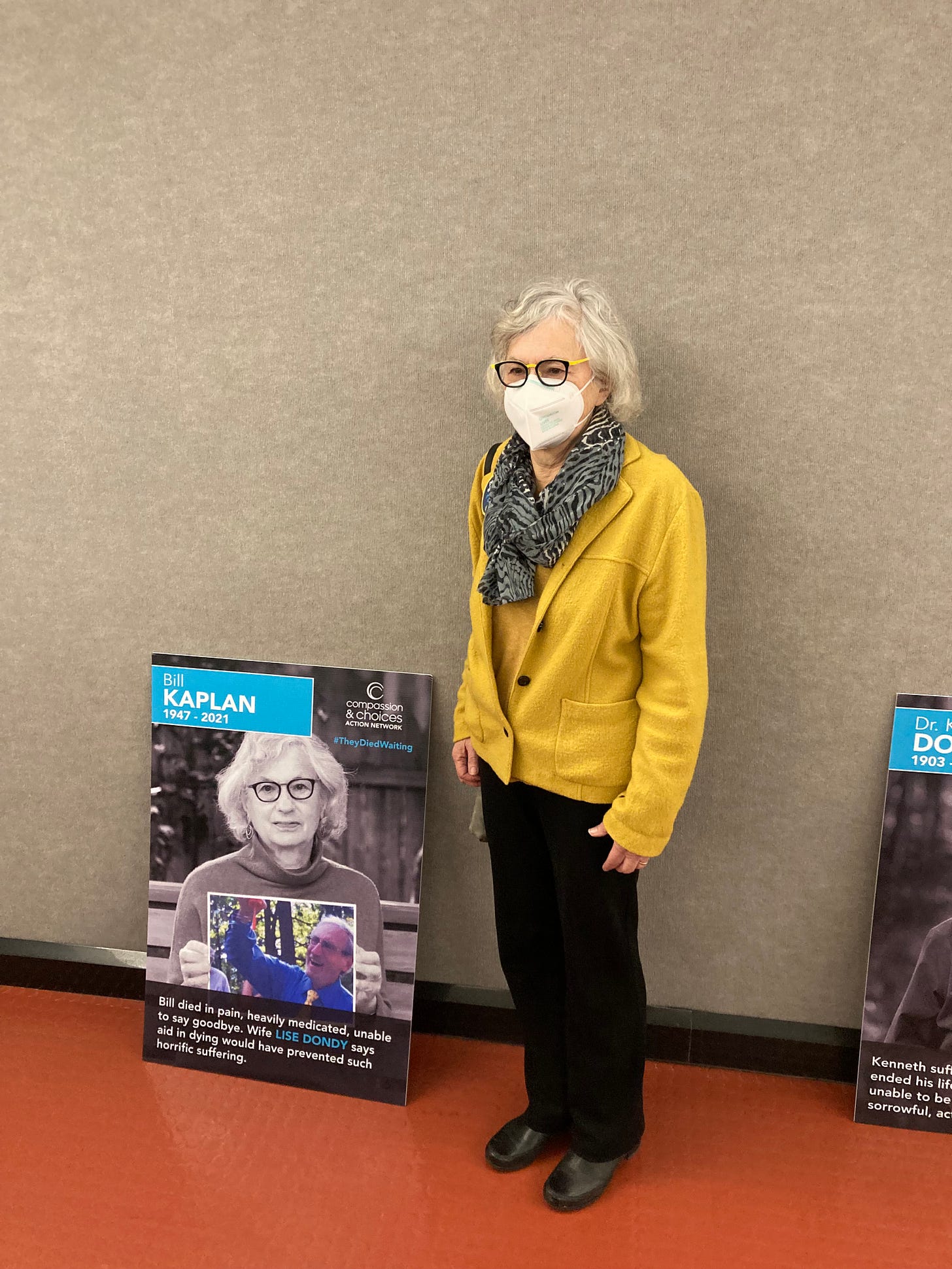My next-door neighbor Bill deserved better
Their stories are heartbreaking. Their pain seems to almost match the pain suffered by their loved ones, who spent years enduring diseases such as cancer and ALS before finally dying.
One of those who died was Bill Kaplan, my next-door neighbor; his wife, Lise Dondy, suffered alongside him. All of us on our tight-knit street watched Bill fight pancreatic cancer with breathtaking bravery for several years until he succumbed at Branford Hospice in 2021.
Lise went to Hartford Wednesday, carrying a photo of Bill — smiling in that winning way of his, blowing bubbles at his daughter Hannah’s wedding.
Beneath the photo, mounted on a poster, was this message: “Bill died in pain, heavily medicated, unable to say goodbye…Aid in dying would have prevented such horrific suffering.”
Lise was joined by a group of others who have lost their spouses or parents to terminal diseases. Some of them tearfully told what they had witnessed. And they said it was all so unnecessary. They called on Connecticut’s legislators to finally pass a bill that would legalize life-ending medication for the terminally ill.
The relatives of those deceased loved ones spoke at a news conference organized by the Compassion and Choices Action Network.
The first to speak was Jill Hammerberg, whose husband, Mark Fey, fought prostate cancer for many years. She called the experience “a nightmare.”
On his final night, she said, “Mark made unearthly sounds as he fought for breath and crawled on our bed in search of relief.”
“If Mark had had access to medical aid in dying,” she said, “he would’ve chosen to use it on a sunny Friday when we were all together. We would’ve been wearing our Red Sox caps, singing ‘Hey Jude,’ followed by a Guinness toast. Instead we carry the collective burden of the indignity of his prolonged pain etched in our hearts forever.”
Kira Philips then told us how her mother, Clare Marie Philips, suffered debilitating back and pelvis pain during a three-year fight with multiple myeloma. The disease made it impossible for her to stand; it compacted her spine.
Philips wept as she recalled: “On June 3rd, 2021, my mom crawled out in the early hours of the morning to our backyard shed and shot herself. It’s unfathomable still that she was capable of even doing something like this, given who she was as a person, being a gentle and kind, compassionate soul. My dad had to find her that morning. He will have that image in his mind the rest of his life. This trauma could have been avoided.”
Jennifer Barahona said her mother, ill with ALS, “lost her ability to speak, then every other motor function. She could only blink. When she blinked ‘yes,’ we withdrew her food support. She had 16 slow, painful days. No one should have to go through what my mother and my family endured.”
The actor James Naughton, who lives in Weston, CT., said his wife, Pamela, died of pancreatic cancer in 2013 after eight months of chemotherapy and four years of weekly trial treatments in Texas.
“After four years, she said to me, ‘Jimmy, I don’t want to wake up anymore.’ It makes no sense to me…There shouldn’t be any question that a person who is suffering should have authority over how his or her life ends.”
Naughton appealed to legislators: “Have mercy. Show a little mercy.”
But as Naughton spoke, citing polls that consistently show a clear majority of Connecticut residents support this legislation (75 percent, says Compassion and Choices), a woman seated behind me quietly said, “Oh, that’s a lie.”
Other opponents of an aid in dying law had also entered the room. at least eight of them. Two were in wheelchairs. They remained silent during the news conference (later they had one of their own) but they held large signs: “Progressives against medical assisted suicide.”
Opposition such as this has shot down aid in dying bills 15 times since 1995.
State Sen. Saud Anwar, a physician, said he formerly opposed this legislation but has changed his mind. He said when suffering cannot be stopped, “you have a responsibility to give those people an option. We have no right to restrict their options.”
Anwar noted the law would require two doctors to verify the patient’s illness is terminal. The patient would need to be deemed of sound mind and able to ingest the medication on his or her own. Those are important safeguards against abuse.
Laws permitting medically assisted deaths already are in place in Oregon, Washington, Montana, Vermont, California, Colorado, Hawaii, New Jersey, Maine, New Mexico and Washington, D.C. Canada also has had such a law since 2016.
After the news conference, the survivors with their photos of their departed walked to a hallway that leads to the legislative chambers and propped the portraits along the wall. I stood near Lise as she placed Bill’s photo there.
These portraits, entitled “They died waiting,” will be seen by legislators through Feb. 1.
I agree with what Naughton said. It’s time for Connecticut’s lawmakers to “show mercy.”




